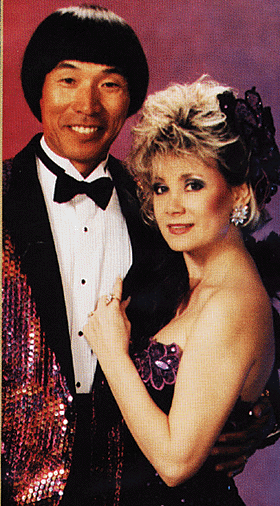GOLDSEA | ASIAMS.NET | ASIAN AMERICAN PERSONALITIES
KING OF BRANSON
PAGE 5 of 12
| "Say person A and person B play just as good. Who stands out, me or him?" |
In college he fell in with a group of students who shared his interest in American country music. "Since I went to see Mr. Acuff, I got into country music and bluegrass music. Bluegrass music was more popular then. There were diehard bluegrass and country fans." Tabuchi and friends traded record albums. At the age of 18 Tabuchi founded a band called Bluegrass Ramblers which ultimately won the all-Japan band competition. Tabuchi became something of a minor celebrity among country music fans and had a standing invitation to perform on the Asahi TV channel. He made enough money as a musician to buy himself his own car, a rarity in the Japan of the 60s. Yet he dismisses his prospects for becoming a musical star in post-war Japan. "I wasn't singing at that time. It wasn't meant to be in Japan."
CONTINUED BELOW
For a chance at a real career in country and western music, Tabuchi felt, he
would have to go to the States. He decided to make his move in early 1967,
shortly before he would have graduated with a bachelor's in economic from
Osaka's St. Andrew's College. "In the back of my mind, [I wanted] to see if I
can get on the Grand Ole Opry or even to see the Grand Ole Opry, and also [the
Wheeling Jamboree] in Wheeling, West Virginia. And also Louisiana Hill.
Those three places I wanted to see."
Tabuchi laid out his plans with Keiji Nozaki, a banjo player three years his
senior, who would be accompanying him. Then he broke the news to his
mother. To his surprise she didn't try to discourage him. She even helped
out with a little money. "Don't worry, I will explain to your dad," she assured
him. At that time the elder Tabuchi was out of the country heading the Thai
subsidiary of a Japanese nylon company. Otherwise, the young musician may
not have mustered the courage to abandon the life that had been laid out for
him.
With $500 in his pockets and another $100 hidden in a shoe, Tabuchi came
with Nozaki to San Francisco on a tourist visa. Tabuchi never thought his
Japanese face would be a handicap in his dreams of becoming an American
music star.

This is a second marriage for partners Dorothy and Shoji Tabuchi.
"Since I came to the U.S. I quickly found out that that is more of an advantage than a disadvantage," he says. "Say person A and person B play just as good. Who stands out, me or him?"
The hippy movement, centered out of the city's Haight-Ashbury district, was in full flower. Despite all the loose talk of free love and universal brotherhood, Tabuchi learned that not being able to speak good English made it hard to be taken seriously as a country musician. Another problem was that it was illegal for him to work with a tourist visa, precluding him from getting a musician's union card and working in regular gigs with established bands. PAGE 6
| PAGE 1 | 2 | 3 | 4 | 5 | 6 | 7 | 8 | 9 | 10 | 11 | 12 |
CONTACT US
|
ADVERTISING INFO
© 1996-2013 Asian Media Group Inc
No part of the contents of this site may be reproduced without prior written permission.
